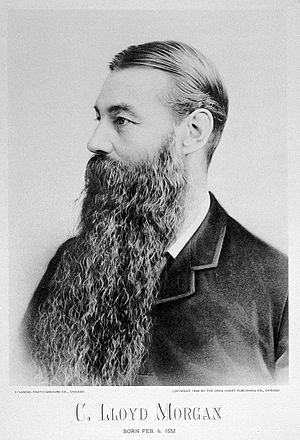C. Lloyd Morgan facts for kids
Conwy Lloyd Morgan (born February 6, 1852 – died March 6, 1936) was a British scientist. He studied how animals behave and think. He is best known for his idea called 'Morgan's canon'. This idea helps us understand animal actions in the simplest way possible. His work was important for the study of behaviorism in psychology.
Contents
Life and Career
Lloyd Morgan was born in London. He studied at the Royal School of Mines with a famous scientist named T.H. Huxley.
He taught in Cape Town, South Africa, for a while. In 1884, he joined University College, Bristol. There, he became a professor of Geology and Zoology. He quickly became very interested in how minds develop. This included looking at the difference between intelligence and instinct in animals.
In 1901, he became the first Professor of Psychology and Education at the college. Later, in 1909, Lloyd Morgan became the first Vice-Chancellor of Bristol University. He held this important role for one year. After that, he taught Psychology and Ethics until he retired in 1919.
Understanding Animal Behavior
Lloyd Morgan's most famous idea is 'Morgan's canon'. It's a rule that says we should explain animal behavior in the simplest way. For example, if an animal does something, we should not assume it's using complex thoughts. We should first look for simpler explanations.
Let's say an animal seems to be thinking deeply. Morgan's canon suggests that its actions might actually be from trial and error learning. This means the animal learned by trying different things until one worked.
A good example is his own terrier dog, Tony. Tony learned to open the garden gate. If you only saw the dog opening the gate, you might think it was very smart. You might think it understood exactly how the gate worked. But Lloyd Morgan watched Tony closely. He saw how the dog slowly learned the steps. Tony tried different things until he figured out how to open it. This showed that the dog didn't need to "understand" the gate. It just learned through practice.
Studying animal behavior helps us understand how animals learn. It also shows how their bodies and brains develop. Animals change how they act as they grow. These changes can be from growing up or from learning new things. Often, it's a mix of both. This is a big part of what ethology studies.
Books by Lloyd Morgan
Lloyd Morgan wrote many books about his studies. Here are some of them:
- The springs of conduct: an essay in evolution. (1885)
- Animal biology. (1887)
- Animal sketches. (1891)
- Introduction to comparative psychology. (1894)
- Psychology for teachers. (1894)
- Habit and instinct. (1896)
- Animal behaviour. (1900)
- Animal life and intelligence. (1890–91; 1891)
- The interpretation of nature. (1906)
- Instinct and experience. (1912)
- Emergent evolution. (1923)
- Life, mind, and spirit. (1925)
- Mind at the crossways. (1929)
- The emergence of novelty. (1933)
Images for kids
See also
 In Spanish: C. Lloyd Morgan para niños
In Spanish: C. Lloyd Morgan para niños




